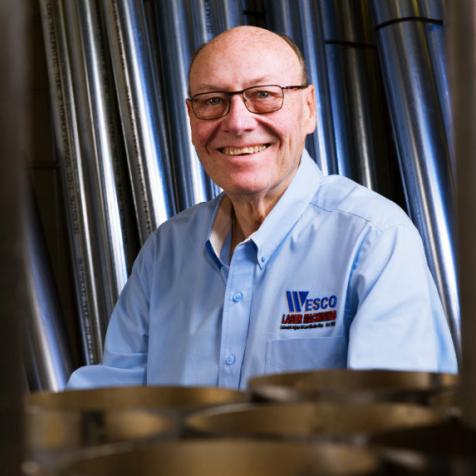
Wesco Laser Machining
By Eric Peterson / CompanyWeek | Nov 17, 2015
Company Details
Location
Denver, Colorado
Founded
1985
Ownership Type
Private
Employees
7
Products
Laser technology
Denver
Founded: 1985
Privately owned
Employees: 7
CEO Mark Welle is guiding Colorado's only laser-only machine shop to steady growth through precision and cutting-edge technology.
Ed Singer founded Wesco as a plastics fabrication job shop, but got into laser machining in the company's early years.
While Wesco still does some plastics work, the focus is on lasers, and that's largely why Welle bought the company in 2004.
He had taken an early retirement from Xerox three years earlier. "I thought I could be a man of leisure and found I couldn't do it," he laughs.

It follows that Welle started shopping for a business in Denver and found Wesco. "One of the things I've learned is unique is always better," he says. So when he came across "a laser-only machine shop . . . the only one in Colorado," he signed on the bottom line and bought the company.
A decade later, Welle has no regrets. "It was a very good decision," he says. "It's allowed me to work closer to the family" -- including his son and Wesco employee, Mark Welle, Jr. "It's a different world. At Xerox, I had 28,000 employees reporting up to me and now I've got six."
Wesco's customers are in aerospace, oil and gas, and a wide range of manufacturing sectors. "Over half of our customers are manufacturers in the Rocky Mountain region," says Welle. "As a job shop, we go from prototyping to long-run production."
The company's arsenal of three lasers includes a 200-watt machine for "light duty" and a pair of 2,500-watt lasers. "It's basically the same heat as the sun," Welle says of the latter. "It converts electricity to 40,000 volts."

One of the pair is "the only 6-axis laser in a job shop environment in Colorado," says Welle. "It allows us to do three-dimensional parts. We can cut around a tube or a square."
The tight tolerances allow for better welding points. "The laser allows us to put tabs on two different points. They snap together so you do not have to build fixtures for the welding," says Welle.
"Some of the core work we do is cutting sheet metal and sheet plate for other manufacturers in town, says Welle. "We can also cut very soft material. There's nothing that cuts faster -- it doesn't distort the material."
Such projects have included parts for the Space Shuttle and the International Space Station.
"We've grown year over year," says Welle. The last 12 months have been a bit slower because of the oil bust, but it remains positive. "We haven't lost any big customers, but some have cut back."

Challenges: "Finding qualified people," says Welle. "We're looking to hire two more people." Laser machining can involve training at manufacturers in California and Japan, and on-the-job training takes about two years at Wesco, he adds.
Market visibility is another challenge. "That's one of the big struggles when you're a small business: getting awareness," explains Welle.
Opportunities: More 6-axis work. "It's much faster and less expensive than traditional cutting," touts Welle, citing railings and architectural work as potential markets. "It's not just aerospace and high tech. There's a lot of low-hanging opportunity with 3D cutting."
Needs: Robotic automation. "There is a lot of repetitive labor work we do that we could leverage robotics for," says Welle. His goal: a "lights out" second shift.
"There is new laser technology that we want to bring in," he adds. "We're still weighing our technical opportunities."

